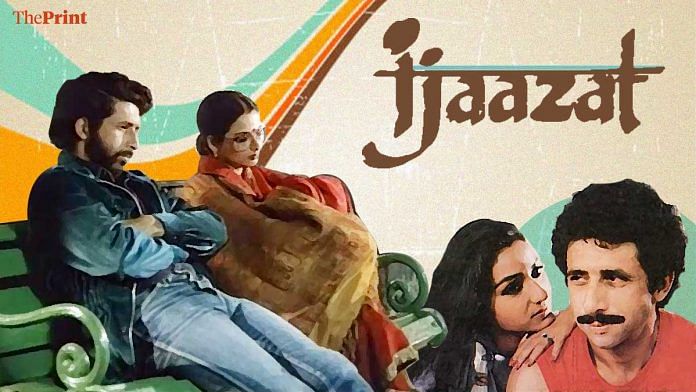One of the most striking scenes of Gulzar’s Ijaazat (1987) is when Mahendra (Naseeruddin Shah) and Sudha (Rekha), a newly married couple, talk about his former lover, Maya (Anuradha Patel). Sudha has constantly come across Maya’s things in the house — a coat, a shawl, a pair of sunglasses and other things that Mahendra has been either too lazy or unwilling to return. It has chafed and gnawed at her, although she has done her best to be graceful about the fact that her house is full of remnants of the woman her husband is still in love with.
When Mahendra finally does return Maya’s things, she writes him a letter about all the other things he ought to return. The memories of 116 moonlit nights, for example. The rain-soaked days they spent together, the freckle on his shoulder, the smell of wet mehendi, the false promises, and a thousand other memories of their love.
An emotional Mahendra reads this letter out to his wife, who now regrets sending Maya’s things back. As it is, she is in this house day and night, what difference does it make if her things are here as well, she says.
And the letter becomes a song, Mera Kuch Saamaan — one of the most beautiful breakup songs ever to be made. Gulzar, who also wrote the film’s screenplay (adapted from a story by Subodh Ghosh) and dialogues, wrote some of the most achingly beautiful lyrics of his career for this free-verse song, put to tune by R.D. Burman and sung to perfection by Asha Bhosle, who, along with Gulzar, won a National Award for it.
The tenderness with which she sings of lost love, of bittersweet memories tinged with regret and of the sensual passion that consumes young lovers makes this the standout track from the movie, but every song, actually, is a gem. And each one is sung solely by Asha Bhosle.
In the week that the singer celebrated her 87th birthday, here is a look back at Ijaazat.
Also read: Shekhar Kapur’s Masoom is as beautifully relatable as it was almost 40 years ago
The waiting room of life
The movie actually opens five years ahead in time, at a railway station, where Mahendra and Sudha, both travelling to different destinations and caught in a heavy downpour, spend the night in the first-class waiting room, where they meet for the first time since they separated.
What happened to this marriage, to Maya, is told through flashbacks, but truthfully, it is what is happening in the present, in the dinky waiting room, that is far more interesting. After the initial awkwardness, the two settle into each other’s company, which feels so familiar and comfortable that Mahendra even says it feels like home.
They squabble over his keenness for a peg of whisky, they crack in jokes about each other’s quirks and habits, she picks up after him when he leaves his wet clothes and towel on the table and even, instinctively, picks up a towel and dries his hair after he returns from trying to find them some food.
The station master, who comes in once or twice before retiring for the night, philosophically tells Mahendra that life is a waiting room. He says it jokingly, but somewhere, there is truth to it. Five years earlier, Sudha left Mahendra abruptly and informed him via a letter, so neither of them really got closure, even though they moved on. It was as if they were in a waiting room all this time, waiting to meet, to revisit old wounds, to finally dress them with the tenderness they deserved five years earlier but never received.
All marriages are different, and so are all divorces
Divorce are not seen through the lenses of good and bad. It is treated with warmth, compassion and a certain understanding that this is a relationship no one else truly knows and has access to except the two people who were in it. And, in Ijaazat, it is shown as not any one person’s fault.
Five years earlier, for example, soon after receiving Maya’s letter, Mahendra decides to take Sudha on their delayed honeymoon. Sudha asks him if he has made this sudden plan because he wants to run away. From whom, he asks. You know the answer, she says. Maya’s presence in their marriage, made all the more apparent by her phone calls, hangs like an oppressively heavy perfume.
Mahendra explains that while he had been in love with Maya, he is trying to forget her, but he won’t be able to do that without Sudha’s help. Because, he says, Sudha thinks about Maya far more than he does.
The entire scene is a telling one for many reasons. It shows, in a few words, Mahendra’s weak selfishness, given that has never bothered to return Maya’s things and make a clean slate for his new wife, and given that he expects his wife to help him get over his lover. It shows Sudha’s unwillingness to let go of the subject, even when they’re going on their honeymoon, her almost pathological desire to talk about Maya. It shows Maya’s childlike lack of respect for the fact that her former lover is now married to someone else and her inability to let him go.
And it shows a marriage that may not be built on love in the conventional sense and didn’t last, but has friendship, brutal honesty and a quiet understanding, even through misunderstandings, that even many lasting marriages don’t have.
Also read: Amar Prem tells the story of relationships that have no name but the power to break hearts




I watched this movie today. What a beautiful movie. The screenplay, story, acting, comedy, songs all are really nice. Thanks for this review, which is what made me watch this movie